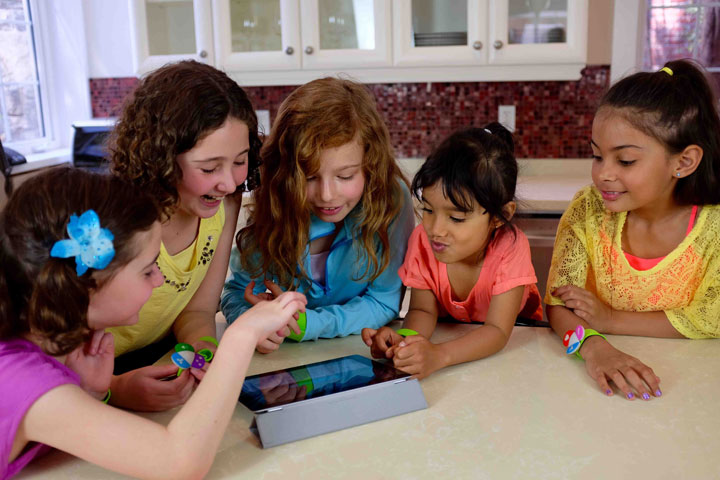TORONTO – Empowering young women to pursue interests in coding and technology has been a hot topic in both the tech world and entrepreneur Lyssa Neel’s home.

After noticing a lack of tech-geared toys for girls at her local toy store, Neel decided to take matters into her own hands by creating a wearable toy aimed at encouraging young girls to explore technology and basic coding.
“I started looking at the studies and saw that the pipeline was really getting choked when girls were really young,” Neel told Global News.
“Sixty-eight per cent of girls in fourth grade say they are interested in science and technology, but they don’t get anything to reinforce that interest – to practice hands on. I thought if we could create a toy that showed girls how fun it was and that they did have the power to use tech, we could keep their engagement going.”
READ MORE: What it’s like for Canadian women working in tech
Neel’s brainchild is Linkitz – a toy that consists of small pieces called “links” and a programmable core that determines what the links do.
The idea is, kids can collect pieces and attach them for different behaviours and reassemble them into a variety of different toys – including things like bracelets, necklaces, or high-tech princess wands.
Linkitz can be used by many age groups. For example, younger kids can simply plug in the links to see what they do. Older kids can check out the “cookbook” – a master list that explains what different things they can make with their Linkitz, for example, a walkie-talkie, or a link that you can put on your shoe that will light up when you dance.
Then, once the user gets more creative with the device, the cookbook encourages them to change the behaviour of the links using simplified computer code.
“Kids these days are so much more advanced – I believe they call them the crystal kids. What it means is that in terms of technology this isn’t something new to them – it’s like breathing,” said Lisa Harun, Linkitz chief marketing officer.
Harun said part of the problem with today’s younger generation of kids – the ones who know how to turn on a smartphone by their first birthday – is that their experience with technology is passive. She said parents often mistake kids being able to pick up a tablet or a smartphone and play games as interacting with tech – but they aren’t really learning.
“Yes, there is a strategic element that’s involved in throwing an Angry Bird, throwing a cow, or crushing candy – but they’re not actively engaged in terms of seeing the basics involved in being able to throw that cow, or crush that piece of candy,” she said.
“Or that they are capable of doing it even at that young of an age.”
- Invasive strep: ‘Don’t wait’ to seek care, N.S. woman warns on long road to recovery
- Canadian food banks are on the brink: ‘This is not a sustainable situation’
- Is home ownership only for the rich now? 80% say yes in new poll
- ‘Super lice’ are becoming more resistant to chemical shampoos. What to use instead
The team behind the wearable toy believes the need for toys like Linkitz is backed up by numbers.
In Canada, women still represent the majority of university graduates, however they remain underrepresented in science, technology, engineering, mathematics and computer sciences (STEM) fields.
READ MORE: Women less likely to choose university program in science, tech, engineering, math
According to the 2011 National Household Survey (NHS), women accounted for 39 per cent of university graduates aged 25 to 34 with a STEM degree in 2011, compared with 66 per cent of university graduates in non-STEM programs.
The 2011 survey – the most recent data Statistics Canada has on the topic – also found that among women who choose to pursue a degree in STEM, most do so in biology or science programs, resulting in even fewer women in engineering, computer science and mathematics programs.
Neel – the 10th woman to earn a PhD in computer science at MIT – hopes that with hands-on experience with toys like Linkitz, girls may be inspired to learn more extensive coding and computer skills.
The team is currently crowdfunding on Kickstarter in hopes of earning $95,000 to put toward mass production and development of Linkitz. The campaign, which kicked off last week, has already earned over $35,000 in funding.
Those who pledge at least $60 to the campaign will receive the Linkitz start set, which includes the programmable core and a set of links, in time for Christmas.












Comments